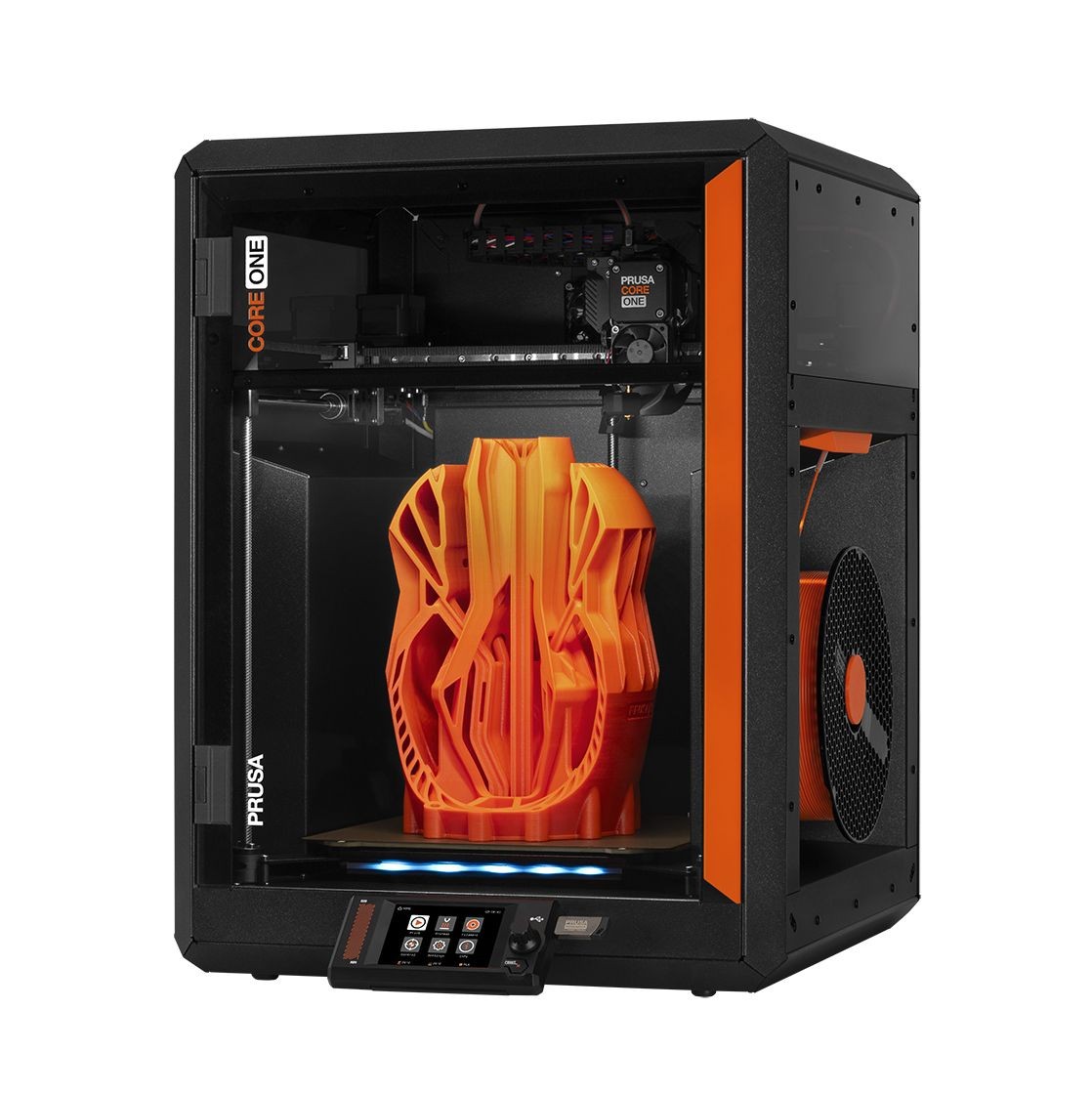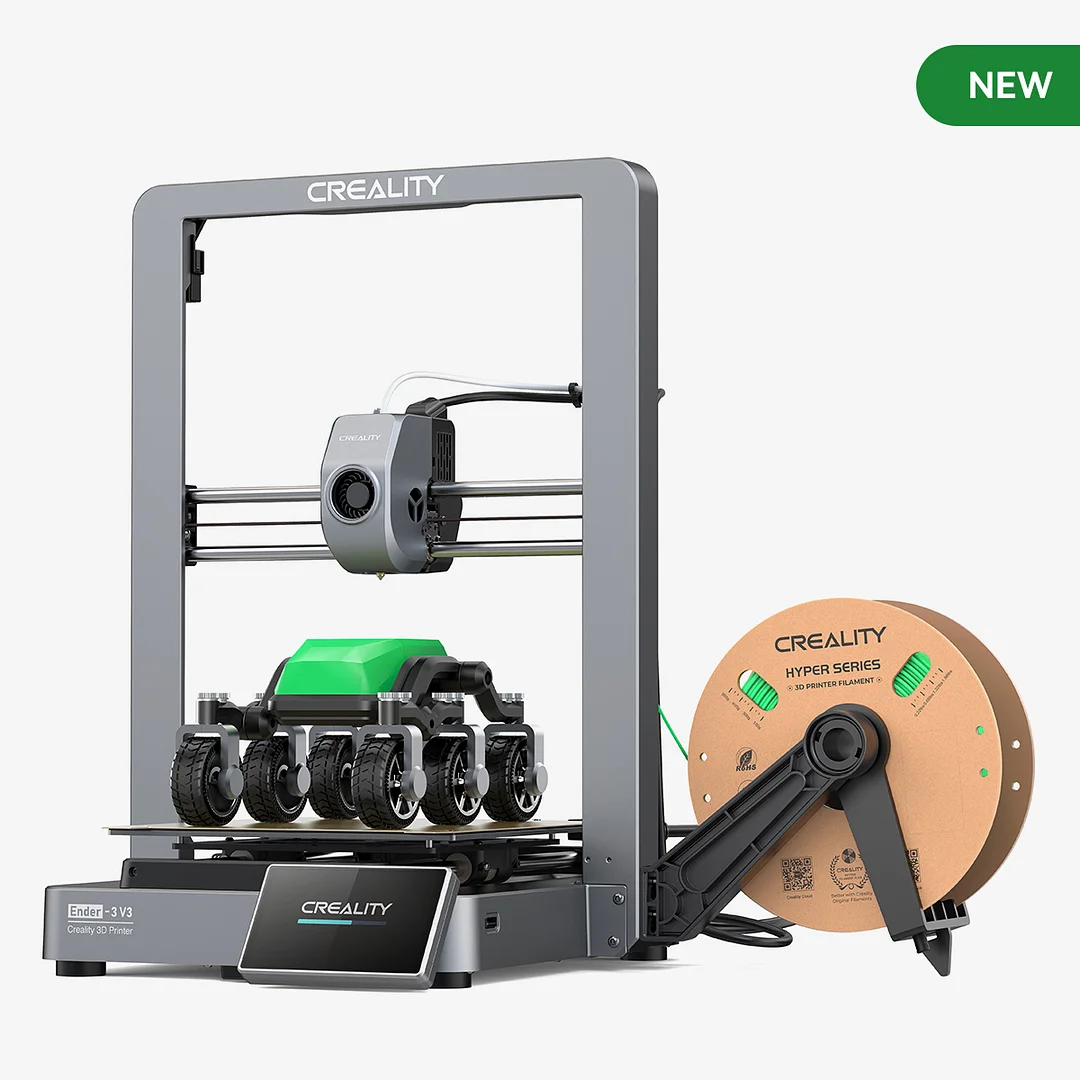Compare Core One vs Ender 3 V3
Comparison between the best 3D printers
Choose the best 3D printer at the best price. The cheapest 3D printers are here.
Buy a 3D printer here with 3D Fila.
 |
 |
|
| Model | Core One |
Ender 3 V3[BUY Ender 3 V3] |
| Printing Material | Filament | Filament |
| Buy Filament for Prusa Core One | Buy Filament forCreality Ender 3 V3 | |
| Estimated price | $1200,00 | $389,00 |
| Manufacturer | Prusa | Creality |
| Release Year | 2025 | 2024 |
| Print Volume [mm] | 250x220x270 | 220x220x250 |
| Printer Size [mm] | 385x340x620 | 358x374x498 |
| Weight [kg] | 14 | 7,12 |
| Power Loss Recovery | YES | YES |
| Enclosed printer | YES | NO |
| Bed Leveling | Automatic | Automatic |
| Filament End Sensor | YES | YES |
| Bed type | Heated | Heated |
| Power supply system | Direct Drive | Direct Drive |
| Standard nozzle | 0,4 | 0,4 |
| Maximum Nozzle Temperature [°C] | 300 | 300 |
| Maximum Bed Temperature [°C] | 120 | 110 |
| Maximum printing speed [mm/s] | 500 | 600 |
| Filament holder | YES | YES |
| Camera for supervision | NO | NO |
| Recommended filaments | PLA, TPU, TPE, HIPS, ABS, PETG, WOOD, PC, PA, PVA, ASA | PLA, PETG e TPU (95A+) |
| Recommended slicers | Cura, Prusa Slicer, Orca | Creality Print, Cura 5.0 ou superior, Prusa Slicer e Simplify3D |
| Maximum Resolution [mm] | 0,01 | 0,01 |
| Processor | xBuddy 32 bit | 32 Bits |
| Display | Touchscreen 3,5'' | 4.3" HD touch screen |
| Power Supply | 240 W | 350 W |
| Connectivity | SD | USB drive, LAN, Creality Cloud APP |
| Operating systems | Windows, Linux e Macbook | Windows, Linux, Macbook |
| Date of registration in the system | 2024-11-27 | 2024-03-01 |
| Release date | 2025 | 2024 |
| Extra features | The Prusa Core One is a CoreXY 3D printer featuring a robust steel frame, a 3.5" touchscreen, and a heated chamber for technical filaments. It offers 360° cooling for improved print quality and supports upgrades from the MK4S model. With a compact design, a print volume of 270x250x220 mm, and compatibility with the MMU3 for multi-color printing, it stands out for its ease of maintenance, precision, and speeds up to 260% faster than the MK3S+. | The Ender 3 V3 redefines 3D printing with its CoreXZ system, reaching speeds of up to 600mm/s, and stable metal construction with cast parts. It stands out for its powerful direct extrusion, quick-change tri-metal nozzle, and two powerful fans for instant cooling. Equipped with automatic calibration, it makes leveling and adjustments easy, promoting a fast and reliable printing experience with various materials. |
| Support for multiple colors and materials (AMS and CFS) | YES | NO |
Notes * |
||
| Cost-benefit | 7 / 10 | 7 / 10 |
| Hardware | 5.4 / 10 | 3.2 / 10 |
| Tela | . | . |
| Print volume | 3 / 10 | 3 / 10 |
| Performance | 4 / 10 | 5 / 10 |
| [BUY Ender 3 V3] |
Conclusion |
| In conclusion, the comparison between the Prusa Core One and the Creality Ender 3 V3 highlights key differences and intended use cases that cater to different segments of 3D printing enthusiasts. The Prusa Core One, priced at a premium, offers advanced features such as a heated enclosed design, automatic leveling, and a broader range of supported filaments, making it a solid choice for professionals or those seeking high-quality prints with technical materials. Its robust build and impressive specifications, including a larger print volume and superior material compatibility, justify its higher cost and make it suitable for demanding projects. On the other hand, the Ender 3 V3 presents itself as an excellent value proposition at a lower price point. With a commendable print speed and modern metal construction, it is designed for users who prioritize speed and reliability without requiring extensive material versatility or advanced features. The Ender 3 V3 is particularly appealing to hobbyists and beginners looking to enter the 3D printing world affordably while still achieving satisfying results. Ultimately, the choice between these two models will depend on the user’s specific needs—whether one values advanced features and a larger print volume over cost-effectiveness and straightforward operation. Both printers have their strengths and weaknesses, making them suitable for different types of users within the growing 3D printing community. |

